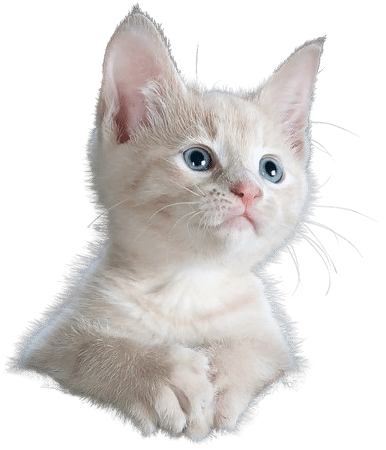Being in the cat grooming business for the past 10 years has allowed me to investigate cat urine odor and its effect on humans. But one persistent question I usually hear from new cat parents is: What are the side effects of breathing cat urine ammonia?
Cat urine has ammonia, which can pose potential health risks if not handled properly or if you expose yourself to it for prolonged periods.
Keep reading to learn:
Table of Contents
The Danger of Cat Urine Ammonia
As much as we love our kitties, most cat parents complain about their cat’s urine smell. After all, a kitty’s pee has a pungent smell.
The urine has urea, which breaks down to release ammonia fumes. If you don’t clean your kitty’s pee or litter box, the urine decomposes and releases ammonia into the air.
The gas can be harmful and induce health complications if not dealt with, which begs the question:
How can you tell that you’re inhaling ammonia?
Signs And Symptoms of Cat Urine Ammonia Poisoning
The signs and symptoms of ammonia inhalation vary depending on exposure time, concentration, and health status.
However, common signs of cat urine poisoning include:
- Sneezing
- Watery eyes
- Nasal congestion
- Breathing difficulty
- Nause and vomiting
- Redness of the eyes
- Runny or stuffy nose
- Coughing and wheezing
- Dizziness and headaches
- Burning sensation in the eyes, throat, and nose
When you’re in a room with cat urine and see any of the above signs, leave the room and seek fresh air immediately.
If you don’t seek fresh air and overexpose yourself to the gas, you can develop health problems.
Possible Complications to Exposure of Cat Urine Ammonia
Chronic exposure to cat urine ammonia can escalate to health issues such as:
- Chronic or acute respiratory problems: Ammonia gas irritates the respiratory system. Even low ammonia concentrations can cause coughing, throat irritation, and difficulty breathing.
At worst, the gas can induce asthma or bronchitis.
- Skin irritation: Ammonia fumes have corrosive properties. And when they come in direct contact with your skin, it start to damage it and cause itchiness.
You can develop chemical burns during prolonged exposure.
- Aggravation of Preexisting Respiratory Conditions: People with asthma or other respiratory conditions may experience worsened symptoms if exposed to ammonia gas.
- Long-term organ damage: If you continuously expose yourself to cat urine ammonia, you can develop kidney and liver problems.
How to Minimize Exposure to Cat Urine Ammonia
You can take some measures to minimize exposure to cat urine ammonia and lower the risk of potential health risks. You can:
- Wear protective gear such as a face mask and gloves when cleaning up cat urine or disposing of your cat’s litter box.
- Keep the litter box clean. Empty and clean the litter box regularly to prevent urine decomposition and release of ammonia fumes.
- Improve room ventilation when cleaning your cat’s litter box or cleaning up any cat urine stains.
- Get a high-quality cat litter odor eliminator to clean cat urine.
How to Clean a Cat Urine And Eliminate Ammonia Gas
There are several ways to clean a cat’s urine and avoid ammonia exposure. Here are handy tips to prevent ammonia formation.
- Use paper towels and newspaper to absorb the urine as much as possible.
- Leverage enzymatic cleaners that dissolve your cat’s urine and smells. The cleaners will break the ammonia into harmless nitrogen and water compounds, helping you eliminate the odor.
- If your cat pees on fabrics like carpets, clothing, and linens, deep clean them. However, avoid hot water because it can set the stain.
- If your kitty has soaked a material with urine, dispose of it and replace it.
Wrapping It Up
Your kitty’s urine contains ammonia, which can be a health hazard if not handled correctly. The side effects of breathing car urine ammonia can vary depending on:
- The ammonia concentration
- Your sensitivity to ammonia
- Duration of the exposure
Leave the area where you suspect ammonia exposure once you see a sign. If the symptoms persist, or worse, seek medical attention.
FAQs
Is breathing cat urine bad for your health?
A cat’s urine has a high concentration of ammonia, which can lead to respiratory problems such as:
Asthma
Bronchitis
Breathing difficulty
Wheezing
Chest tightness
Besides respiratory issues, inhaling cat urine smell can cause eye irritation, runny or stuffy nose, sneezing, nasal congestion, nausea, vomiting, or allergic reaction.
Can ammonia from cat litter make you sick?
Litter boxes can cause overexposure to ammonia and make you sick. The ammonia vapor can irritate your respiratory system, induce headache and dizziness, and even worsen preexisting conditions like asthma and bronchitis.
What happens if you breathe too much cat ammonia?
Ammonia overexposure can trigger several disorders, such as:
Tracheal burns
Nasopharyngeal cancer
Alveolar edema
Airway damage
Bronchiolar edema
All the above conditions can lead to respiratory distress or malfunction.
What are the symptoms of ammonia poisoning from cat urine?
The immediate signs of ammonia poisoning include:
Runny nose
Red eyes
Itchy skin
Rashes
Coughing
Gasping for air
Rapid shallow breathing
Severe redness of the eyes
Ammonia poisoning from cat urine typically results from prolonged exposure to ammonia vapor.
Is cat urine toxic to breathe?
Breathing in car urine can make you sick. The pee is full of ammonia — a toxic gas that can trigger asthma attacks, cause headaches, and even induce respiratory illnesses like pneumonia.
What home remedy gets rid of the cat’s urine smell?
The best home remedy to eliminate cat urine odor is white vinegar and water to neutralize the smell. You should soak the area and then let it dry. The smell will disappear over a few days.
